| Release List | Reviews | Price Search | Shop | Newsletter | Forum | DVD Giveaways | Blu-Ray/ HD DVD | Advertise |
| Reviews & Columns |
|
Reviews DVD TV on DVD Blu-ray International DVDs Theatrical Reviews by Studio Video Games Features Collector Series DVDs Easter Egg Database Interviews DVD Talk TV DVD Talk Radio Feature Articles Columns Anime Talk DVD Savant HD Talk Horror DVDs Silent DVD
|
DVD Talk Forum |
|
|
| Resources |
|
DVD Price Search Customer Service #'s RCE Info Links |
|
Columns
|
 |
Literary Classics Collection
|
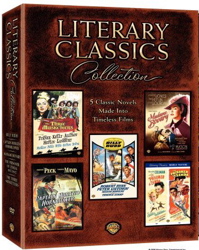
|
Warner DVD The Prisoner of Zenda (1937 + 1952), The Three Musketeers, Madame Bovary, Captain Horatio Hornblower, Billy Budd Street Date March 6, 2007 59.98 the boxed set Reviewed by Glenn Erickson |
The idea of being exposed to great works of literature through movies used to be the kiss of death for young male filmgoers -- unless the story promised to have a few swordfights, or something else to deflect the boredom of kissing scenes and reams of dialogue. I remember a kid in high school who said he only wrote book reports when he could get the Classics Illustrated comic book version, and he wasn't kidding. I think he's now a retired Highway Patrolman ...
Warners' Literary Classics Collection
takes the pain out of thick books by dead guys. The titles here probably led many viewers to go back and read the source novels. The movies aren't exclusively from classics, in the sense that I don't see C.S. Forester being listed with Charles Dickens and Herman Melville. But the spirit is there. And heck, in four out of six films, we get at least one good swordfight!
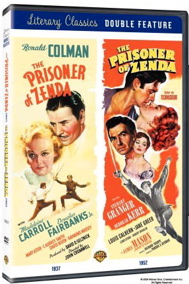
The Prisoner of Zenda (1937); The Prisoner of Zenda (1952)
1937 / B&W / 1:37 flat full frame / 101 min.
Starring
Cinematography James Wong Howe
Art Direction Lyle Wheeler
Film Editor James E. Newcom
Original Music Alfred Newman
Written by Wells Root, John L. Balderston, Donald Ogden Stewart from a dramatization by Edward Rose from the novel by Anthony Hope
Produced by David O. Selznick
Directed by John Cromwell
1952 / Color / 1:37 flat full frame / 96 min.
Starring
Cinematography Joseph Ruttenberg
Art Direction Cedric Gibbons, Hans Peters
Film Editor George Boemler
Original Music Alfred Newman
Written by Wells Root, John L. Balderston, Noel Langley, Donald Ogden Stewart from a dramatization by Edward Rose from the novel by Anthony Hope
Produced by Pandro S. Berman
Directed by Richard Thorpe
Available separately at 19.98
The original The Prisoner of Zenda is the one Golden-Age classic of the set, a top drawer David O. Selznick production back when his literary adaptations were held in high esteem. MGM apparently bought the remake rights, for in 1952 they remade it practically scene for scene and word for word, in Technicolor. The original 1937 version is one of the better Ronald Colman movies. Colman is mostly remembered today for his incredibly suave voice; people under 50 will be reminded of the many cartoons that used it for fun, as when 'Donald Duck found his Voice' in one cartoon. The second version is not held so highly, even though it has some excellent casting to recommend it.
The Prisoner of Zenda is an exciting story, certainly well-told. The idea of identical doubles is introduced in a clever way and good split screen effects allow the two Rudolfs to do things like shake hands. Also, besides one ballroom scene and a coronation parade, the movie isn't crammed with expensive or enormous crowd scenes. For the original, producer David O. Selznick probably made a deal to swap one of his contract actors for a day's shooting on a ballroom set, with extras already assembled and organized for another MGM picture! (well, perhaps).
With both versions so conveniently at hand the temptation is to do a direct comparison. The original scores a few points for being, well, original. The script of the second does show some changes in that bits of dialogue have been trimmed; it's actually shorter. Richard Thorpe's Technicolor camera is certainly more brilliant than John Cromwell's B&W work, but the old version has the benefit of lighting master James Wong Howe. Similar sets take on a lot more mystery and character in the original. A few settings in the color version look like they belong in a Disney adventure with Richard Greene, or something.
Stewart Granger gets high marks for sincerity but he's neither as loveable or as romantic as Colman. Colman's reactions to the plot turns are fresher and his encounters with the other characters seem deeper. He's touched by Mary Astor's sincere need for Michael, the bad guy; Granger and the dreamy Jane Greer just seem to bump into each other in the night. The competition between Madeleine Carroll and Deborah Kerr is a draw. They're both convincing as royal chattels overjoyed to fall in love with the man they thought they'd have to be forced to marry. There's no denying Kerr's ability to hold a romantic close-up, but Carroll has the edge because Selznick lays on the sentiment for an effectively gushy lover's finale, complete with vows of fidelity and swelling violins. Perhaps MGM felt the same extreme of emotion was too much for 1952 audiences, and Kerr's last scene is much more subdued.
The smaller cast members aren't that important except that David Niven is at least more interesting than Robert Coote. Louis Calhern must have been miffed to be given the C. Aubry Smith "old guy" part, and he doesn't seem as invested in the role.
Where the remake wins hands down is with James Mason as the spirited, double-crossing villain Rupert. Douglas Fairbanks Jr. seems lightweight in the first picture, and just isn't enough of a dastard. Mason has the time of his life playing a Prussian peacock certain that all good things come to he who stabs first. Mason makes the same dialogue sparkle, even a little aside about the fact that he once knew two twin girls that, well, never mind. Mason's Rupert never admits that he's downhearted when things don't go his way, and he fights the hero with the kind of devilish glee that only shows up in penny-dreadful potboilers. I'm afraid that Rupert is so interesting, we almost wish he would find religion and end up with the girl.
Another good thing about the remake is that it came before the advent of CinemaScope. When MGM and other studios tried remaking their legendary hits in the first years of the anamorphic process, the result was almost disastrous. This remake probably felt like routine work for all but the actors trying to make the best of it. The only crime is that James Mason had to dither about in pictures like this in between better opportunities like Julius Caesar and Bigger Than Life.
I mentioned that "young people" might not be familiar with Ronald Colman. Until Savant caught up with The Prisoner of Zenda in the 1970s, I didn't realize that Blake Edwards had done an entire capsule version of it in the middle of his bloated super-comedy The Great Race. The production values of Edwards' quasi- spoof remake are way above anything seen in either earlier version of the Anthony Hope novel.
Kathleen Freeman plays a sneaky housemaid in Version #2, an effective bit part. I feel like starting a Kathleen Freeman fan club. She's always delightful. I just saw her in a tiny but hilarious part in Fox's disc of O. Henry's Full House.
The 1937 and 1952 versions of The Prisoner of Zenda occupy both sides of a flipper disc. The older copy looks fine but suffers somewhat from grain, probably because of the source elements. The Technicolor version is immaculate. Each side has a selection of short subjects and other extras; the '37 version of The Prisoner of Zenda is the only disc in the collection not accompanied by an original trailer.
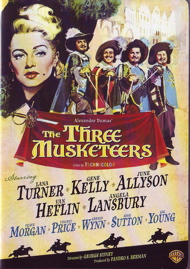
The Three Musketeers
1948 / Color / 1:37 flat full frame / 125 min. / Available separately at 19.98
Starring Lana Turner, Gene Kelly, June Allyson, Van Heflin, Angela Lansbury, Frank Morgan, Vincent Price, Keenan Wynn, John Sutton, Gig Young, Robert Coote, Patricia Medina, Marie Windsor
Cinematography Robert Planck
Art Direction Malcolm Brown, Cedric Gibbons
Film Editor George Boemler, Robert J. Kern
Original Music Herbert Stothart
Written by Robert Ardrey from the novel by Alexandre Dumas
Produced by Pandro S. Berman
Directed by George Sidney
Savant's favorite version of The Three Musketeers will remain Richard Lester's Two-part version from the early 1970s but this Technicolor MGM attempt is no slouch. It has plenty of acrobatic action and is for the most part cast well. And Louis B. Mayer finally gives us Lana Turner in a role we enjoy watching --- she keeps a date with the headsman!
George Sidney's The Three Musketeers gets off on the wrong foot with some unwelcome comedy by Gene Kelly, whose charm in movies somehow always depended on being in motion. Everyone else plays it mostly straight but in many scenes Kelly seems to be doing a parody, as if the film were "The Royal Rascal" from Singin' in the Rain -- which does indeed recycle an action scene or two from this picture.
But once Kelly applies his acrobatic dancing skills to the sword fights, The Three Musketeers takes off. He's at least as graceful as Douglas Fairbanks and some of his stunts involve impressive leaps, as far as twenty feet or so. Kelly was stunt-doubled for the wildest action but he earns his stripes as a swashbuckler.
June Allyson is something of a corn-fed Constance yet manages to be an endearing plus. Lana Turner is indeed hissable as a transparently devious viper. She and Vincent Price share a number of chortling laughs at their own villainy, just the kind of cereal-box sniveling the film needs. The only standout among the musketeers is Van Heflin as the drunkard with a past. We can see his secret past coming a mile away, so there's little surprise when he turns out to be related to another major character. Athos' dour nature is a drawback in that it adds to the film's uneven texture ... the heroes are mourning a terrible loss one minute and being devil-may-care the next.
Screenwriter Robert Ardrey (The Wonderful Country) can simplify the story only so far. The musketeers are still required to spend half the picture darting back and forth across the French countryside and over to England. That means far too many exteriors with Hollywood landscaping standing in for French gardens, and Southern California chapparal serving as the lush French countryside. The production is lean -- a war montage is filmed on a Roger Corman budget -- but those Technicolor cameras are expensive. Costumes also seem to be chosen for their color above any other considerations. When the four heroes walk in step at court, they look like playing cards. We almost expect to see Jerry Mouse keeping pace alongside them.
But Alexandre Dumas' famed story is nigh unkillable, and The Three Musketeers is both exciting and dramatically sound on its own terms. We're plenty surprised by the grim downturn of the last act. A lesson to young women in adventure stories: Never get serious with an adventure hero who needs to come back unmarried for the sequels.
Keenan Wynn is okay as D'Artagnan's faithful servant. Sultry siren Marie Windsor (The Narrow Margin) is granted only two lousy shots as a disloyal handmaiden to Lady Anne. But she's in Technicolor!
MGM's The Three Musketeers looks sensational on DVD. Either the film was reconstituted digitally from Technicolor matrices or the people who made composite negatives for this one really did a careful job. If only this kind of miracle would happen to our favorite films! The extras must have been chosen by year of release: A Traveltalks overview of bomb damage in central London, and a Tex Avery Cartoon. A radio extra is a promotion for Lana Turner in conjunction with the movie.
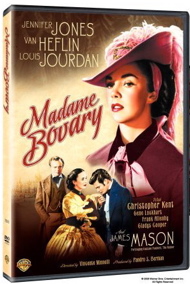
Madame Bovary
1949 / B&W / 1:37 flat full frame / 115 min. / Available separately at 19.98
Starring Jennifer Jones, James Mason, Van Heflin, Louis Jourdan, Christopher Kent (Alf Kjellin ), Gene Lockhart, Frank Allenby, Gladys Cooper
Cinematography Robert Planck
Art Direction Cedric Gibbons, Jack Martin Smith
Film Editor Ferris Webster
Original Music Miklos Rozsa
Written by Robert Ardrey from the novel by Gustave Flaubert
Produced by Pandro S. Berman
Directed by Vincente Minnelli
Vincente Minnelli's Madame Bovary has found few friends in critical circles. The moralistic story seeks to express sympathy for a restless and unfaithful wife but does so in a way that causes audiences to give up on her almost from the start. Perhaps the problem with the film is its obviousness. Not only does a clunky faux flashback structure tell us that Emma Bovary is a lost cause, but both the story and the acting give us no reason to side with the errant French housewife. A lot of the blame for this show on the actress Jennifer Jones, when it should have gone to director Minnelli's shallow interpretation: Character is more than Décor and costumes.
The key to Minnelli's Madame Bovary is the ballroom scene, which blazes with the joy of Emma's dreams coming to life. She looks up at an ornate mirror and sees herself, truly beautiful, surrounded by admiring men. Of course, her social triumph is the beginning of the end, for the film is a fated tragedy. In an awkward framing story, author Gustave Flaubert goes on trial to defend his pornographic book and is allowed to relate it in detail to a French court. Specially billed James Mason is great in this one-man act, but it detracts from the movie's effectiveness. Just as in a fated film noir, right at the start we know Emma is going to come to no good. A noir update of Madame Bovary is handled as an off-screen tragedy in Jules Dassin's The Naked City, where a beautiful country girl comes to the city and winds up an anonymous victim. Her parents come to collect the body and can offer only a pitiful whine: "Oh Lord. Why couldn't she have been born ugly?"
Madame Bovary spends two hours watching Emma take the plunge. Why doesn't the film work? After all, Linda Darnell takes a lot more time corrupting herself in Forever Amber and we enjoy that show every step of the way. The answer is partly Jennifer Jones and partly the script. Jones was always perfect raw material for a director with a plan. She could be saintly or wicked as the scripts allowed, but this story establishes her from the start as a charming girl with bad values. Emma worships a wall of cherished pictures of fairy-tale images -- fancy dress balls, etc. This visual shorthand substitutes for any real character exploration. We're even told that racy romance novels smuggled into church school warped Emma's immature mind, as if wayward girls wouldn't exist if literary censorship were enforced.
Jennifer Jones' performance has few surprises. She frets when she feels stifled by her husband's lack of excitement or imagination. In the eyes of society he is completely faultless and she is completely guilty, a judgment reinforced by both the script and the direction. When Emma turns sour and sullen at the birth of a girl (she wanted a boy), Minnelli and company must have known that the audience will brand her a worthless hussy from that point onward.
Flaubert's story was an indictment of the double standard and the inequality faced by women but this film version simply shows a foolish woman digging her own grave. We're supposed to see Charles Bovary as an innocent victim and Emma as a reckless agent of chaos. If Jennifer Jones is to be faulted, it's that another actress -- Olivia de Havilland? Susan Hayward? -- might have used her wits and her own personal spirit to fill-in the pieces of Emma's personality missing in the script. Then again, a William Wyler or a George Cukor could have helped Ms. Jones do the same thing.
Van Heflin's Charles doesn't seem selfless enough to endure Emma's lack of love. Louis Jourdan is once again a wretched cad; the only place to see him transcend this stereotype, at least for a moment, is in Max Ophuls' magnificent Letter from an Unknown Woman. The rest of the actors sketch types. We think very highly of Jennifer Jones, and wish that her career wasn't so spotted with misfires and good projects ruined by her micro-managing husband.
The disc of Madame Bovary looks fine, with perfect B&W picture and sound. By the post-war period I should think that Americans were becoming weary of European-set movies filmed in Culver City and populated by actors with American accents. Although the art direction does a fine job of disguising the same ten exterior sets, most also show up in Technicolor in the Musketeers movie. I have to say that insular Hollywood movies played a big role in keeping Americans ignorant about the rest of the world.
Besides a trailer, Warner DVD gives us a Pete Smith Specialty short and one of Tex Avery's funnier Droopy cartoons, Out-Foxed.
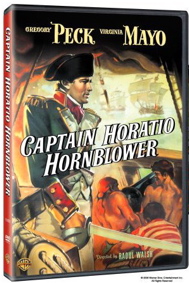
Captain Horatio Hornblower
1950 / Color / 1:37 flat full frame / 117 min. / Available separately at 19.98
Starring Gregory Peck, Virginia Mayo, Robert Beatty, Moultrie Kelsall, Terence Morgan, James Kenney, James Robertson Justice, Denis O'Dea, Stanley Baker, Christopher Lee, Alec Mango
Cinematography Guy Green
Art Direction Thomas Morahan
Film Editor Jack Harris
Original Music Robert Farnon
Written by Ivan Goff, Ben Roberts, Aeneas MacKenzie adapted by C.S. Forester from his novel
Produced by Gerry Mitchell, Raoul Walsh
Directed by Raoul Walsh
Captain Horatio Hornblower is less a classic adaptation than an extension of the swashbuckling adventure movies that Warners tried to re-launch in the late 1940s: Errol Flynn in The Master of Ballantrae and a sparkling series of energetic Burt Lancaster pictures: The Flame and the Arrow, His Majesty O'Keefe and The Crimson Pirate. Don't get me wrong: C.S. Forester's adventure novels are respectable. But the exploits of Captain Horatio Hornblower are mighty close to the serialized James Bond tales ... except that Gregory Peck only made one of them.
Captain Horatio Hornblower is a solid effort to recapture the spirit of the old Curtiz/Flynn swashbucklers of the 1930s. The Sea Hawk was filmed in B&W so that stock footage from earlier pirate epics could be re-used but this Napoleonic-era sea tale starts over again in Technicolor. It must have been quite an expensive proposition because at least fifteen solid minutes of the picture is comprised of detailed special effects and quick-cut battle action ... Technicolor films tended toward fewer setups whenever possible.
Gregory Peck makes a fine Hornblower, no doubt filling out his antique uniform better than most of the real officers of the time. Producer-director Raoul Walsh surrounds Peck with English actors to offset the fact that the actor makes no effort at an English accent. The role isn't much of a stretch for Peck, considering that all he must do is look decisive, bark orders and then play nice guy to favored members of the crew. His key officers are given dialogue to prop up Hornblower's prowess as a seaman and a warrior.
Coming off a little better is Virginia Mayo, direct from Walsh's triumph White Heat. After her gum-chewing floozy Mayo positively shines in the 'Olivia de Havilland' role of the proper lady forced to marry the wrong man. Ms. Mayo behaves with dignity, has a couple of great kissing scenes with Peck and looks swooningly, fleshily alive in her Technicolor close-ups. Unfortunately, the film's idea of wit is to have Hornblower give forth with a mighty 'harrumph' throat-clearing noise whenever he's surprised or at a loss for words. This is supposed to make Mayo see that her lover is really a boy at heart. The gag is used so often we half expect somebody to jam a handful of hay into Peck's mouth, so he can chew it like a cow.
The movie skimps on the extras -- Hornblower tangles with a Latin American madman and the whole French Army but we mostly see a few limited cutaways interspersed between fine miniature and effects work, including excellent painted mattes by the late Peter Ellenshaw. The script and direction are mercilessly prejudiced against Latin Americans, all of whom are swarthy, foul creeps played by Englishmen and Americans with atrocious accents. Mayo's squealing, moronic maid is treated with contempt. That's not at all unusual for movies, practically all the way to the 1970s.
The three sea battles rival the old Errol Flynn pictures in the effects department. The miniature ship work is excellent, and the chaos on deck as guns explode and rigging crashes downward is almost as exciting as in the originals. Union controls result in fewer shots where actors and extras are put in harm's way, however, resulting in fewer really dazzling stunts (and probably fewer unreported fatalities).
The supporting cast collects a lot of fun faces: James Robertson Justice (The Guns of Navarone) roughly fills in the old Alan Hale role. Denis O'Dea is Hornblower's unpleasant rival. A very young Stanley Baker takes orders and blows a whistle a lot on deck. And lanky Christopher Lee is impressive as a Spanish ship captain who loses a swordfight with Hornblower -- even though our hero claims he got the lowest marks in his academy class in swordsmanship.
Captain Horatio Hornblower is the only actual Warners' film in this Warner DVD boxed set. The image quality and audio are quite good, much better than on old TV prints. The extras include a patriotic short subject My Country 'Tis of Thee and a Bugs Bunny cartoon Captain Hareblower. In addition to a trailer, Peck and Mayo appear in a radio adaptation of the story.
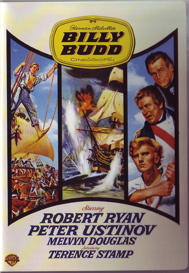
Billy Budd
1962 / B&W / 2:35 enhanced anamorphic / 119 min. / Available separately at 19.98
Starring Robert Ryan, Peter Ustinov, Melvyn Douglas, Paul Rogers, John Neville, David McCallum, Ronald Lewis, Robert Brown, John Meillon, Niall MacGinnis, Terence Stamp
Cinematography Robert Krasker
Production Design Donald Ashton
Art Direction Peter Murton
Film Editor Jack Harris
Original Music Antony Hopkins
Written by Peter Ustinov, DeWitt Bodeen from the play by Louis O. Coxe, Robert H. Chapman from the novel Billy Budd, Foretopman by Herman Melville
Produced by A. Ronald Lubin, Peter Ustinov
Directed by Peter Ustinov
The collection leaps forward ten years for this superb adaptation of Herman Melville's mysterious examination of the duties and obligations of men at war -- to their country, their officers, to each other and to themselves. The liner notes mention a conflict between good and evil -- easily identified as the Terence Stamp and Robert Ryan characters -- but the theme goes far beyond that. The heavily symbolic book is given an insightful and subtle interpretation by the versatile Peter Ustinov, with an assist from writer DeWitt Bodeen. It's easily the best Melville committed to film.
The moral dilemma conjured by Herman Melville for Billy Budd is both universal and timeless. In the brutal and extreme situation of men at war, authority and discipline can exact a terrible toll on the individual sailor, so much so that one's own officers can seem more of an enemy than the foreigners on the opposing ships. Billy Budd sets up a recipe for disaster. Resentment and harsh discipline on the man o' war are a given state of affairs, and the open-faced Billy upsets that balance with his simple goodness. Among the officers only the reasonable Captain Vere seems to appreciate Billy; Vere can envision a navy where the sailors serve because they believe in the mission and trust their officers, and not because they are threatened and whipped.
The sailors below decks are a cross section of strength and weakness. Billy makes friends with all of them, even though he has to fight the hotheaded Enoch Jenkins (Ronald Lewis of Mr. Sardonicus). The old sail maker Dansker (Melvyn Douglas, Hud and The Americanization of Emily) and others accept Billy for exactly what he is, uncomplicated and honest.
Above decks it's a different matter. The junior officers (Paul Rogers, John Neville, David McCallum) can play no favorites, but the malevolent Claggart has the notion that no ship can run properly unless the crew is properly terrorized. Claggart enjoys the whippings on deck. He hides his cruel tricks from the captain and employs secret snitches like Squeak (Lee Montague) to bring back murmurings of dissent. Billy Bears no malice but also fears no man. He believes in the fairness of his superiors and takes Captain Vere's morale speeches literally. When Claggart addresses Billy the young man responds with a smile and his own attempt at a chipper reply. Anything less than quivering obeisance from the seamen makes Claggart murderously insecure. Billy faces an unreasonable foe and has no defense. Faced with a hostile situation, he remains quiet, and if forced to speak, often cannot get the words out. When Billy stammers, Claggart decides that they boy is two-faced, and is mocking him.
High school literature teachers analyze Billy Budd by deciding that Billy is The Christ, Claggart is Satan and Captain Vere an unhappy Pontius Pilate. This interpretation certainly helps sketch the story conflict but the problems in Billy Budd will be familiar to any person caught in a political bind -- at work, in school, in any organization -- where it seems that good intentions are defeated by the malicious application of the power of rank. After a shocking 3rd Act incident Captain Vere is put into an impossible position of condemning a good man that he knows to be essentially innocent. Protocol and the rules of the sea demand one thing and fairness demands another. Yet Vere has more conflicts; he's supposed to do what's good for the whole boat, not just one foretopman. Will dispensing mercy weaken the fighting ability of his crew? Will he be showing favoritism?
The moral conflict of Billy Budd comes to a shattering climax unseen in other movies of this kind. Stanley Kubrick's Paths of Glory faces a similar issue but chooses a situation where the only rational conclusion is to brand the officer class as murderers and swine. Captain Vere and his command are much more complex, and nobody is simply a villain. Claggart is a black-hearted sadist, but we know that even he is a product of the system, just as is Billy.
Ustinov filmed Billy Budd on board a real sailing vessel at sea, and the film looks it; it's a realistic adventure story with plenty of exciting incident. Terence Stamp's debut picture shows only one aspect of the actor's talent, but he's a perfect Billy ... one never forgets his happy cry, "God Bless Captain Vere!" In the context of the scene, it cuts like a knife. Ustinov's direction of actors is masterful and can be criticized only when it comes to his own character. Captain Vere never settles on a particular mindset and seems to be some kind of audience surrogate. He isn't quite so vulnerable in the book. Perhaps that's really evidence of directorial wisdom, and not a weakness.
Robert Ryan is incredibly good as the monstrous Claggart. Saddled with a career playing uninteresting soldiers and western bad guys, the really desirable Robert Ryan roles stand out like gems: The Set-Up, On Dangerous Ground, The Wild Bunch. John Claggart has uncommon depth; we watch his face for subtle changes of mood. When Ryan's eyes start to go glassy we know there's trouble on the way.
Warners' disc of Allied Artists' Billy Budd is going to be a rare treat for many viewers. Since its theatrical premiere it's been shown in its proper CinemaScope ratio only infrequently on the Turner Classic Movie cable channel. The screen is always crowded with important faces which are lost, along with the great atmosphere on the boat, when the film is Pan-Scanned. The B&W image is clean and sharp, giving us a good look at all the early-60s acting talent.
A trailer is included. An added plus is a commentary with Steven Soderbergh interviewing Terence Stamp about the entire experience. We learn about several of the other actors as well as how Stamp reacted to landing such a showcase role for his first film ... instant stardom resulted. The actor is both articulate and likeable. Soderbergh directed Stamp in the superior crime thriller The Limey back in 2001.
On a scale of Excellent, Good, Fair, and Poor,
|
The Prisoner of Zenda (1937) rates:
Movie: Excellent Video: Good Sound: Very Good Supplements: Pete Smith short subject, Cartoon The Wayward Pups, radio adaptation with Ronald Colman. |
The Prisoner of Zenda (1952) rates:
Movie: Good Video: Excellent Sound: Excellent Supplements: Traveltalk short Land of the Taj Mahal, cartoon Johann Mouse, Trailer. |
|
The Three Musketeers rates:
Movie: Very Good ++ Video: Excellent + Sound: Excellent Supplements: Traveltalk Looking at London; Tex Avery Cartoon What Price Fleadom?, Radio Promo celebrating Lana Turner; Trailer |
Madame Bovary rates:
Movie: Very Good + Video: Excellent Sound: Excellent Supplements: Pete Smith Specialty Those Were the Good Old Days; Tex Avery Cartoon Out-Foxed, Trailer |
|
Captain Horatio Hornblower rates:
Movie: Very Good ++ Video: Excellent Sound: Excellent Supplements: Short Subject My Country 'Tis of Thee; Cartoon Captain Hareblower; Radio adapation with Gregory Peck and Virginia Mayo, Trailer |
Billy Budd rates:
Movie: Excellent Video: Excellent Sound: Excellent Supplements: Commentary with Terence Stamp and Steven Soderbergh; Trailer |
Packaging: Five slim cases in card sleeve
Reviewed: February 26, 2007
Review Staff | About DVD Talk | Newsletter Subscribe | Join DVD Talk Forum
Copyright © MH Sub I, LLC dba Internet Brands. | Privacy Policy | Terms of Use
|
| Release List | Reviews | Price Search | Shop | SUBSCRIBE | Forum | DVD Giveaways | Blu-Ray/ HD DVD | Advertise |





